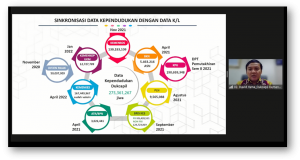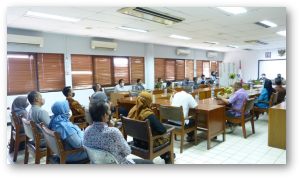LD FEB UI 58th Anniversary Seminar, “12 Trillion has been Mobilized for Server Procurement for One Data Indonesia”
DEPOK – (12/8/2022) In commemoration of the 58th anniversary of the Demography Institute of FEB UI (LD FEB UI), the Demography Institute held a hybrid seminar entitled “Post-Pandemic Population Challenges Realizing One Data Indonesia”. The issue of one integrated data is significant in policy making. Currently, there are approximately 2400 data applications in all Ministries and Institutions, both at the central and regional levels. In addition, as much as 12 trillion rupiahs has been spent on server procurement projects that are unfortunately not synchronized. Because of this, especially in the context of population, President Joko Widodo said that the commitment of Satu Data Indonesia is highly expected to provide a consistent and credible database that is needed to produce quality, accurate, up-to-date, and integrated policies to be efficient and effective.
The seminar, which Dr. Abdillah Ahsan moderated as the Head of the Demography Institute of FEB UI, presented several speakers from Ministries and Institutions, including Hari Dwi Korianto, M.Si, as Director of Systems and Procedures for Monitoring, Evaluation and Development Control of the Ministry of PPN/Bappenas; Dr. Ir. David Yama as Director of Population Registration of the Ministry of Home Affairs; Dr. Sarpono as Director of Systems and Procedures for Monitoring, Evaluation and Development Control of the Central Bureau of Statistics; Munawar Asikin, M.S.E., as Director of Population Planning and Control of BKKBN; and Omas Bulan Samosir as senior researcher of LD FEB UI.
The seminar, attended by approximately 600 government and higher education participants, began with remarks from the Dean of FEB UI, Teguh Dartanto, Ph.D., followed by the cutting of tumpeng. LD FEB UI is expected to continue to survive and always impact society or stakeholders through sharing innovations in each of its activities.
The first speaker, Hari Dwi Korianto, M.Sc., the Director of Systems and Procedures for Development Monitoring, Evaluation and Control of the Ministry of PPN/Bappenas as well as the Secretary of the One Data Indonesia Secretariat at the Central Level, explained about “Accelerating the Implementation of One Data Indonesia.” In order to implement the government’s digital transformation policy, the President of the Republic of Indonesia has given five directives related to digital transformation policies, including those related to accelerating the provision of internet services covering 12,500 villages, accelerating the preparation of digital transformation roadmaps in all strategic sectors, accelerating the construction of national data centers, accelerating the preparation of digital talent human resources (HR) needs, as well as preparing regulations and funding schemes and digital transformation costs. The role of academics is also expected to support the One Data Indonesia Program by encouraging the implementation of quality government data by providing expertise and experience in aspects of data governance, data management, and data utilization; encouraging the preparation of data standards and specifications; and encouraging the use of the One Data Indonesia Portal in data utilization and dissemination of research results.
The second speaker, Dr. David Yama, Director of Population Registration, explained that one data is a challenging task and has many obstacles, especially in managing population data for Indonesia, which is the fourth most populous country in the world. In this case, Dukcapil Kemendagri has tried to synchronize population data with ministries/institutions by updating data related to births, deaths, moving, coming, marrying, and divorcing. The data then produces analyses such as social assistance recipients who own vehicles and those who work as ASN. Most recently, Dukcapil Kemendagri has conducted a gradual trial related to Digital Identity, namely population identification in a digital format in a single mobile device that can represent individuals in digital applications uniquely and reliably, and can be connected to physical, electronic ID cards.
The third speaker, Dr. Sarpono, Director of Systems and Procedures for Monitoring, Evaluation, and Control of BPS Development, explained the 2020 Population Census amid the Covid-19 pandemic starting from the utilization and synchronization process to BPS strategy in realizing One Data Indonesia. The development agenda in improving the quality of Indonesian people will not be realized if accurate data do not support it. Therefore, in the last 2020 Population Census (SP2020). Although in its implementation, it experienced several obstacles, BPS has made efforts to synchronize the SP 2020 data with the Ministry of Home Affairs’ population administration data; one agricultural data with the Ministry of Agriculture, KKP, and KLHK; MSME Single Database, with Kemenko UKM, Ministry of Trade and BKPM; One Employment Data with Kemenaker.
The fourth speaker, Munawar Asikin, M.S.E., as Director of Population Planning and Control of BKKBN. The Fourth Speaker, Munawar Asikin, Director of Population Planning and Control of BKKBN, explained the urgency of family data collection, the first is the need for family development data (from birth to the elderly), and the second is to support evidence-based policy, namely how micro-level data can be a strengthening strategy when talking about data-based policies until finally it can be widely utilized. To date, BKKBN has recorded around 5 million families with infants, 14 million families with toddlers, 32 million with adolescents, and 16 million with the elderly. BKKBN, in the future, will use a concept that has also been used by BPS, namely the Generic Statistical Business Process Model (GSBPM). It is hoped that all data can be integrated so that policies can be carried out immediately and are very valid.
LD FEB UI senior researcher Omas Bulan Samosir, Ph.D. closed the dissemination by explaining the study conducted with Bappenas and UNFPA regarding population projections. Omas explained that there are many population data. One of the data used for development planning is population projections, a collaboration/marriage of sectoral data with population data that produces population projections to meet the needs for essential immunization services and reproductive health services for the elderly population. Omas explained that the key to building sustainable cooperation in Satu Data Indonesia is a shared vision and goals and respect between all stakeholders, continuous communication and commitment to work through any differences in perspective, and building trust. At the end of the talk, Omas explained that “Satu Data Indonesia” means facilitating all parties to access the data so that it can be the basis of planning projected in the following years.
For further information, please contact narahabung:
Finda Prafianti, S.Sos.
Corporate Secretary of Demography Institute FEB UI
corsec@ldfebui.org
08119692610



